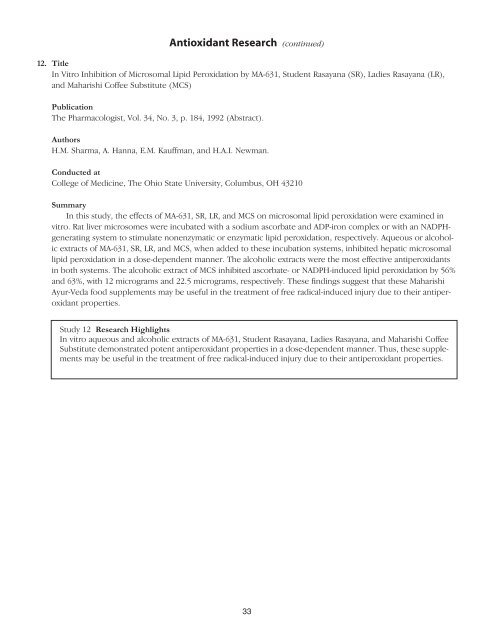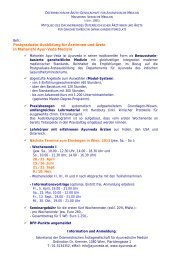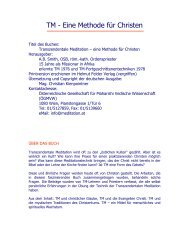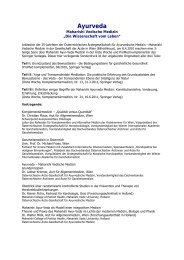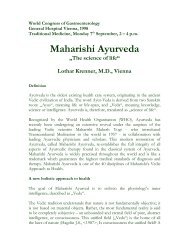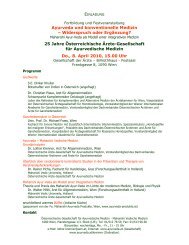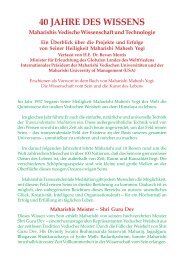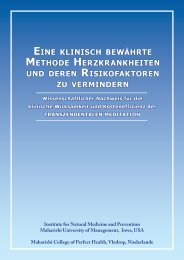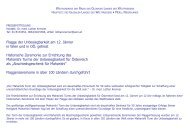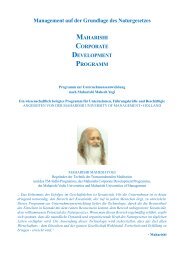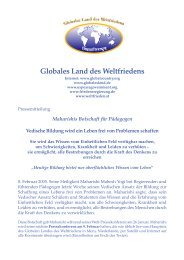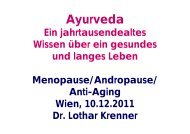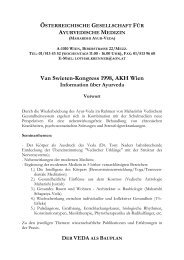Summary of Research Findings
Summary of Research Findings
Summary of Research Findings
Create successful ePaper yourself
Turn your PDF publications into a flip-book with our unique Google optimized e-Paper software.
Antioxidant <strong>Research</strong> (continued)<br />
12. Title<br />
In Vitro Inhibition <strong>of</strong> Microsomal Lipid Peroxidation by MA-631, Student Rasayana (SR), Ladies Rasayana (LR),<br />
and Maharishi C<strong>of</strong>fee Substitute (MCS)<br />
Publication<br />
The Pharmacologist, Vol. 34, No. 3, p. 184, 1992 (Abstract).<br />
Authors<br />
H.M. Sharma, A. Hanna, E.M. Kauffman, and H.A.I. Newman.<br />
Conducted at<br />
College <strong>of</strong> Medicine, The Ohio State University, Columbus, OH 43210<br />
<strong>Summary</strong><br />
In this study, the effects <strong>of</strong> MA-631, SR, LR, and MCS on microsomal lipid peroxidation were examined in<br />
vitro. Rat liver microsomes were incubated with a sodium ascorbate and ADP-iron complex or with an NADPHgenerating<br />
system to stimulate nonenzymatic or enzymatic lipid peroxidation, respectively. Aqueous or alcoholic<br />
extracts <strong>of</strong> MA-631, SR, LR, and MCS, when added to these incubation systems, inhibited hepatic microsomal<br />
lipid peroxidation in a dose-dependent manner. The alcoholic extracts were the most effective antiperoxidants<br />
in both systems. The alcoholic extract <strong>of</strong> MCS inhibited ascorbate- or NADPH-induced lipid peroxidation by 56%<br />
and 63%, with 12 micrograms and 22.5 micrograms, respectively. These findings suggest that these Maharishi<br />
Ayur-Veda food supplements may be useful in the treatment <strong>of</strong> free radical-induced injury due to their antiperoxidant<br />
properties.<br />
Study 12 <strong>Research</strong> Highlights<br />
In vitro aqueous and alcoholic extracts <strong>of</strong> MA-631, Student Rasayana, Ladies Rasayana, and Maharishi C<strong>of</strong>fee<br />
Substitute demonstrated potent antiperoxidant properties in a dose-dependent manner. Thus, these supplements<br />
may be useful in the treatment <strong>of</strong> free radical-induced injury due to their antiperoxidant properties.<br />
33


